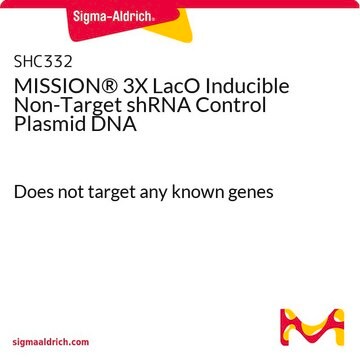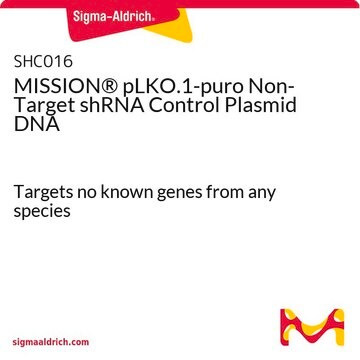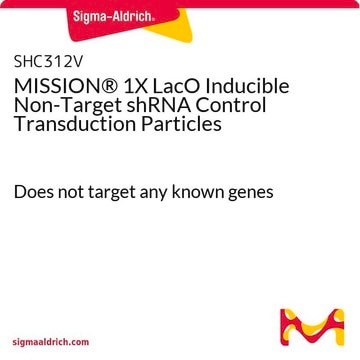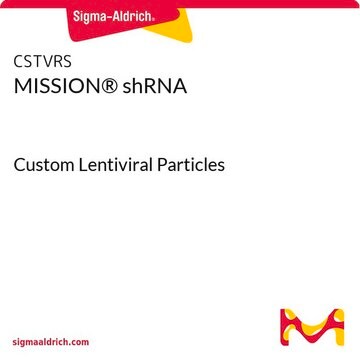SHC332V
MISSION® 3X LacO Inducible Non-Target shRNA Control Transduction Particles
Does not target any known genes
Sign Into View Organizational & Contract Pricing
All Photos(1)
About This Item
UNSPSC Code:
41106609
NACRES:
NA.51
Recommended Products
Related Categories
General description
Sigma® is proud to offer IPTG-inducible vectors as the latest development from our continued partnership in TRC.
The pLKO vector has been redesigned to contain a LacI (repressor) and a modified human U6 shRNA promoter with LacO (operator) sequences. In the absence of IPTG (isopropyl-Β-D-thio-galactoside), an analogue of lactose, LacI binds to LacO preventing expression of the shRNA. When IPTG is present, the allosteric LacI repressor changes conformation, releasing itself from lacO modified human U6 promoter, and subsequently allows expression of the shRNA.
The MISSION 3x LacO Inducible Non-Target shRNA Control Transduction Particles contain an shRNA insert that does not target any known genes, making it useful as a negative control in experiments using the MISSION inducible shRNA library clones. This allows one to examine the effect of transfection of a short-hairpin on gene expression and interpret the knockdown effect seen with shRNA clones. Ampicillin and puromycin antibiotic resistance genes provide selection in bacterial or mammalian cells respectively. In addition, self-inactivating replication incompetent viral particles can be produced in packaging cells (HEK293T) by co-transfection with compatible packaging plasmids. 200 uL of 106 TU/ml (via p24 titering assay) lentiviral particles are provided as frozen stock.
When conducting experiments using MISSION® shRNA clones, the proper controls should be a key element of your experimental design to allow for accurate interpretation of knockdown results.
The pLKO vector has been redesigned to contain a LacI (repressor) and a modified human U6 shRNA promoter with LacO (operator) sequences. In the absence of IPTG (isopropyl-Β-D-thio-galactoside), an analogue of lactose, LacI binds to LacO preventing expression of the shRNA. When IPTG is present, the allosteric LacI repressor changes conformation, releasing itself from lacO modified human U6 promoter, and subsequently allows expression of the shRNA.
The MISSION 3x LacO Inducible Non-Target shRNA Control Transduction Particles contain an shRNA insert that does not target any known genes, making it useful as a negative control in experiments using the MISSION inducible shRNA library clones. This allows one to examine the effect of transfection of a short-hairpin on gene expression and interpret the knockdown effect seen with shRNA clones. Ampicillin and puromycin antibiotic resistance genes provide selection in bacterial or mammalian cells respectively. In addition, self-inactivating replication incompetent viral particles can be produced in packaging cells (HEK293T) by co-transfection with compatible packaging plasmids. 200 uL of 106 TU/ml (via p24 titering assay) lentiviral particles are provided as frozen stock.
When conducting experiments using MISSION® shRNA clones, the proper controls should be a key element of your experimental design to allow for accurate interpretation of knockdown results.
Application
To see more application data, protocols, vector maps visit sigma.com/shrna.
Legal Information
MISSION is a registered trademark of Merck KGaA, Darmstadt, Germany
Sigma is a registered trademark of Sigma-Aldrich Co. LLC
recommended
Product No.
Description
Pricing
Storage Class Code
12 - Non Combustible Liquids
WGK
WGK 3
Flash Point(F)
Not applicable
Flash Point(C)
Not applicable
Certificates of Analysis (COA)
Search for Certificates of Analysis (COA) by entering the products Lot/Batch Number. Lot and Batch Numbers can be found on a product’s label following the words ‘Lot’ or ‘Batch’.
Already Own This Product?
Find documentation for the products that you have recently purchased in the Document Library.
M Pérez-Alea et al.
Oncogene, 36(41), 5695-5708 (2017-06-06)
Despite the promising targeted and immune-based interventions in melanoma treatment, long-lasting responses are limited. Melanoma cells present an aberrant redox state that leads to the production of toxic aldehydes that must be converted into less reactive molecules. Targeting the detoxification
Related Content
Explore the benefits of IPTG-inducible vectors through performance data. These vectors offer regulated expression, which is important when studying essential and lethal genes.
Our team of scientists has experience in all areas of research including Life Science, Material Science, Chemical Synthesis, Chromatography, Analytical and many others.
Contact Technical Service







